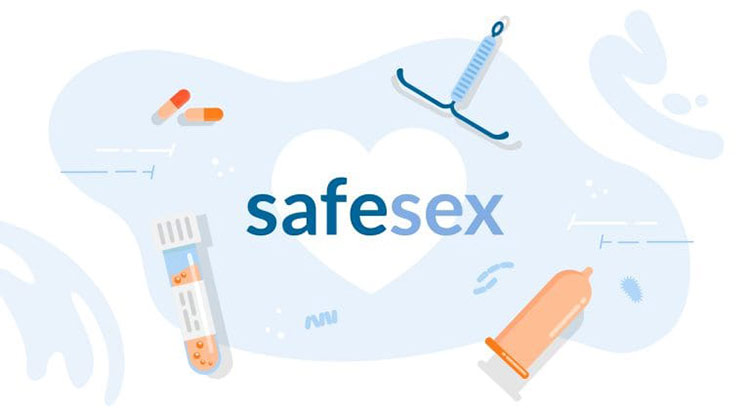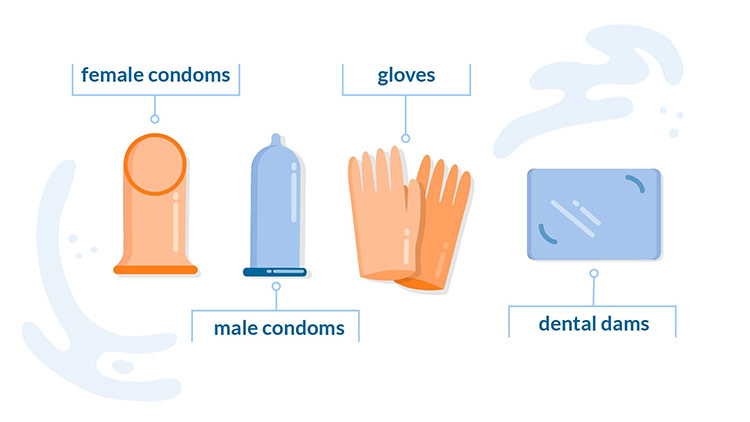Once you are sexually active, you will need to ensure that you are always having safe sex. This can help you drastically reduce the risk of catching STDs such as herpes and HIV. This may be the unglamorous side of sex, but it is something that you cannot ignore. After all, certain STDs can significantly affect your health and have many terrible side effects.
So what exactly is safe sex and how can you practice it? In this blog post, we’ll go through eleven safe sex practices that actually work. Once you start following these practices, you will find that your sex life is a safe and happy one!
1) Know Your Current Status
Once you are sexually active, it is very important that you get your sexual health checked out as often as possible. Ideally, you need to do this each time you get a new sexual partner. This is even necessary if you are no longer sexually active for a long period. That’s because some STDs do not show their symptoms for the first few months. For instance, chlamydia symptoms might mot appear for a while after the sufferer as contracted it. By the time you finally realize that you have an STD, it may be too late, and you could have already passed it on to someone. It is also important that your new sexual partner gets checked out as well. That way, you can be sure that he or she isn’t going to pass anything onto you.
2) Use Condoms
Condoms are one of the best ways to prevent the spread of STDs. Even though a condom can greatly reduce your risk of being infected, you still need to remember that this method isn’t 100% effective. Male condoms are the most common form of condoms. However, if a man does not want to wear one during intercourse, his female partner can wear a special condom that fits inside her vagina. Some people are allergic to latex, which is what condoms are made out of. If this is you, you can still use latex-free condoms. You should use condoms for all forms of penetrative sex. That includes vaginal and anal intercourse.
3) Use Other Types Of Protection
Condoms are the best form of protection when you are having penetrative sex. But did you know that there are other types of protection that keep you safe during other sexual activities? For example, you can buy dental dams that have been specially designed to protect you during oral sex. If you are using your hands during foreplay, you can also use latex gloves to prevent spreading any STDs. Are you currently using a contraception method to stop yourself from getting pregnant? Then you still need to use something to stop getting STDs. The only form of sexual protection that prevents pregnancy and STDs is a condom. Both male and female condoms provide protection against pregnancy and STDs.
4) Use Your Protection Safely
When you use condoms, it is important that you use them safely and correctly. If you don’t, then your chances of catching an STD are very likely to increase. It is very important that you and your partner both know how to put on a condom correctly. This can make sure that as much of the semen is blocked from entering the vagina as possible. It is sometimes also necessary to use lubrication with your condom. That is because a condom can tear if not properly lubricated. When you are choosing your lubricant, try to stay away from oil-based ones. The oil in the formula can actually increase the condom’s chances of tearing.
5) Be Careful With Alcohol And Drugs
Alcohol and drugs aren’t going to increase your chance of catching STDs on their own. But they can lead you to make very risky choices. And it is this risky behavior that can help spread a variety of STDs. Be sure not to ever overindulge when drinking or using drugs, as this can lead to a bad sexual decision. If you are very drunk, you may also be putting yourself at risk of sexual assault. When you do drink on a night out, make sure that you are always with your friends. They will be able to help you get home safely if you ever drink a bit too much.
6) Practice Monogamy
Sticking with a monogamous partner can help to keep your chances of catching an STD very low. This is because you can both get tested to make sure that you are clear. One benefit of having an STD-free long-term partner is that you will not need to use a condom during sex. Once you are in a monogamous relationship, it is important that both you and your partner remain faithful to one another. If you choose to have sex with a partner outside of your primary relationship, and it hasn’t been discussed with everyone involved, you could unwittingly bring an STD into your relationship.
7) Don’t Douche After Sex
In the past, it was thought that women should douche after sex to make sure that there is no semen left inside them. However, it is now known that this can actually increase the risk of STDs. That’s because douching can remove a lot of natural bacteria from the vagina. And most of these bacteria help the body fight STDs. So by douching, you are preventing your body from fighting against infections and dangerous bacteria. Rather than resorting to such methods, you should make sure that you are using protection correctly. If you do, you will not have to rely on these unnecessary quick-fix methods.
8) Keep Your Sexual Partners Down To A Minimum
The fewer sexual partners you have, the lower your chance is of catching an STD. It makes sense if you think about it because you aren’t putting yourself at risk so much. Try and find monogamous sexual partners who you know will be faithful. If you are single, try and stay away from one-night stands as you may not know exactly who you are having sex with. If you do ever find yourself indulging in casual sex, make sure that you are always protected and use a condom.
9) Clean Sex Toys
Many couples use sex toys to add an extra element of excitement to their relationship. These shouldn’t spread any STDs as long as you use them correctly. If you regularly use sex toys with your sexual partner, you should make sure that these are cleaned after every use. You may also want to sterilize your toys in between use for added protection. If you would rather not go to the bother of washing your toys, you can use a condom on them. This should keep the toy clean while you use it. Make sure you clean the instructions that come with each toy thoroughly. Some toys will require different methods of cleaning.
10) Communication Is Very Important
When you do get a new sexual partner, it is very important that you are completely open and honest with them. If you do have an STD that is currently being treated, you need to let them know. This way, you can figure out the best form of protection to use to keep your partner safe. It is also worth telling them about any past STDs you have had, even if you are now clean. You should also encourage your partner to talk to you about their sexual health history as well. Some STDs and sexual infections are not curable, which will result in you and your new partner having to always use protection during sex. If this is the case, inform your partner so that they can stay safe and take the necessary precautions.
11) Abstain From Sex
Ultimately, there is only one method that is 100% effective at preventing the spread of STDs. And that is not having any sexual contact with others. This is also the only 100% effective way of preventing pregnancy. It is always important to abstain from sex until you are completely ready, both emotionally and physically. Just because you are in a relationship doesn’t mean you have to have sex straight away. You may want to wait until you are completely happy with your new partner. If this is the case, be sure to communicate with them to let you know that you want to wait. By being honest with all your partners, you are helping to protect each other’s sexual health. If you are single, abstaining is also a lot healthier than indulging in multiple one-night stands.
You will find that if you follow all the above safe sex practices, you can enjoy a healthy and happy sex life. Not only that, though, but your partners will also benefit from a potentially STD-free sex life as well.
No one wants to end up taking an emergency trip to the sexual health clinic after having sex. Hopefully, this blog post has given you plenty of ideas of how you can prevent that situation from ever happening!



